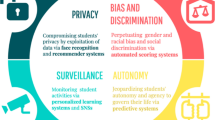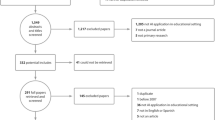Abstract
This study investigates the impact of artificial intelligence (AI) on learners’ sustainability in higher education, focusing on the context of Bangladesh. The article aims to provide insights into the specific ways in which AI technologies and approaches can be applied within the Bangladeshi higher education context to promote sustainability. Through a mixed-methods approach, combining quantitative surveys and qualitative interviews, data were collected from a diverse sample of students enrolled in both private and public universities in Bangladesh. This study used a quantitative approach via a survey that consisted of 25 items to collect relevant data. Structured questionnaires are used to obtain data from 350 respondents selected with convenience sampling. The questionnaire used a 5-point Likert scale to measure a degree of agreement or disagreement with each of a series of statements related to learner’s sustainability. A pilot study with 40 participants was also undertaken to ensure the validity of the questionnaire. Factor analysis is employed to assess the hypotheses in the study. Additionally, reliability test, correlation and multiple regression method was used to examine the associations between the dependent variable and independent variables. According to the study’s findings, quantitative analysis indicates that AI-driven concepts such as adaptive learning, personalized learning, teaching evaluation, and educational equity significantly contribute to enhancing educational sustainability. Moreover, virtual classrooms and administrative tasks have been traced as the main barrier to enhancing educational sustainability. Additionally, qualitative findings shed light on the perceived benefits and challenges associated with integrating AI into higher education for sustainability purposes. This study specifically contributes to the fill the research gap of unravelling the uses of AI technologies in Bangladeshi higher education context. The policy makers should take these findings into consideration while planning the higher education policy; for instance, not focusing on virtual classrooms since it is found as a barrier to higher education sustainability.

Similar content being viewed by others
References
Ahmed F, Hamdan A (2023) Sustainable innovative approaches of digital technology in business training and employee performance: literature review emerging trends and innovation in business and finance, pp 507–517
Ali M, Mir M, Musharaf S, Hossain Sajid S (2023) Examining the role of artificial intelligence in determining sustainable competitive advantage: evidence from the pharmaceutical sector of Karachi Pakistan. Journal of Future Sustainability 3(1):23–34
Azoulay A (2019) Towards an ethics of artificial intelligence. UN Chron 55(4):24–25
Bergamin P, Hirt FS (2018) Who’s in charge? —dealing with the self-regulation dilemma in digital learning environments. In: Knowledge management in digital change, pp 227–245
Bodo B, Helberger N, Irion K, Zuiderveen Borgesius F, Moller J, van de Velde B, de Vreese C (2017) Tackling the algorithmic control crisis-the technical, legal, and ethical challenges of research into algorithmic agents. Yale JL Tech 19:133
Brown EC, Aman MG, Havercamp SM (2002) Factor analysis and norms for parent ratings on the aberrant behavior checklist-community for young people in special education. Res Dev Disabil 23(1):45–60
Chassignol M, Khoroshavin A, Klimova A, Bilyatdinova A (2018) Artificial intelligence trends in education: a narrative overview. Procedia Comput Sci 136:16–24
Chen T, MdYunus A, Ali WW, Bakar A (2008) Utilization of intelligent tutoring system (ITS) in mathematics learning. Int J Educ Dev Using ICT 4(4):50–63
Chen, Su YS, Tseng WL, H W, Lai CF (2023) Applying STEM and extended reality technologies to explore students' artificial intelligence learning performance and behavior for sustainable development goals. Library Hi Tech
Colchester K, Hagras H, Alghazzawi D, Aldabbagh G (2017) A survey of artificial intelligence techniques employed for adaptive educational systems within e-learning platforms. J Artif Intell Soft Comput Res 7(1):47–64
Dheeriya P, Singhvi M (2021) A conceptual framework for replacing audit committees with artificial intelligence infused bot. EDPACS 63(3):1–18
Hair JF, Anderson RE, Tatham RL, Black WC (1998) Factor analysis. Multivariate data analysis. NJ Prentice-Hall 3:98–99
Hasan MK, Ghazal TM, Ahmad M, Alzoubi HM, Alshurideh M (2022) Machine learning approaches for sustainable cities using internet of things. In: The effect of information technology on business and marketing intelligence systems, Springer International Publishing, Cham, pp 1969–1986
Hossain N, A U, Othman MTB, Zafar J, Zafar H, Rahman, Hamam H (2020) Accessing artificial intelligence for fetus health status using hybrid deep learning algorithm (AlexNet-SVM) on cardiotocographic data. Sensors 22(14):5103
Iftikhar P, Kuijpers MV, Khayyat A, Iftikhar A, De Sa MD (2020) Artificial intelligence: a new paradigm in obstetrics and gynecology research and clinical practice. Cureus 12(2)
Islam MJN, Rana S, Nayeem MR (2020) Prediction of heart disease using machine learning algorithms. European Journal of Artificial Intelligence and Machine Learning 1(3):22–26
Jaiswal A, Arun CJ (2021) Potential of artificial intelligence for transformation of the education system in India. Int J Educ Dev Inform Commun Technol 17(1):142–158
Johnson M, Jain R, Brennan-Tonetta P, Swartz E, Silver D, Paolini J, ... Brown, Hill C (2022) Impact of big data and artificial intelligence on industry: developing a workforce roadmap for a data driven economy. Glob J Flex Syst Manag 22(3):197–217
Jones, Chang YL, Brown Ke J (2023) Socially responsible artificial intelligence empowered people analytics: a novel framework towards sustainability. Hum Resour Dev Rev 23(1):88–120
Khan I, Memon AB, Luhana KK (2023) The rise of artificial intelligence and its influence on employee performance and work. Global Social Sciences Review, VIII, 463–479
Kim, Chen (2023) Sustainable educational metaverse content and system based on deep learning for enhancing learner immersion. Sustainability 15(16):12663
Kim JH, Kim M, Kwak DW, Lee S (2023) Home-tutoring services assisted with technology: investigating the role of artificial intelligence using a randomized field experiment. J Mark Res 59(1):79–96
Liu A, Saxena N, Jain M, C H, Hernandez-Garcia Bengio Y (2023) Multi-fidelity active learning with gflownets. arXiv preprint arXiv:2306.11715
Luo X, Tong S, Fang Z, Qu Z (2019) Frontiers: machines vs. humans: the impact of artificial intelligence chatbot disclosure on customer purchases. Mark Sci 38(6):937–947
Mahmood LA, Yousef H, Yousuf Rocha-Meneses L (2020) Artificial intelligence for management of variable renewable energy systems: a review of current status and future directions. Energies 16(24):8057
Miller, Russell RG, Garvey K, Patel M, Thomas Craig KJ, Snowdon J, Novak LL, (2023) Clinical use of artificial intelligence requires AI-capable organizations. JAMIA open, 6(2):ooad028
Pillai R, Sivathanu B, Mariani M, Rana NP, Yang B, Dwivedi YK (2021) Adoption of AI-empowered industrial robots in auto component manufacturing companies. Prod Plann Control 1–17
Rahman MM, Rahaman MS, Moral IH, Haque Chowdhury MS (2022) Entrepreneurship education and entrepreneurial intention of business graduates: does artificial intelligence matter? In: Proceedings of international conference on fourth industrial revolution and beyond 2021. Singapore, Springer Nature Singapore, pp 109–123
Rahman SMMM, Barros A, Hossain, Whaiduzzaman M (2023) Impact prediction of online education during COVID-19 using machine learning: a case study. In: Intelligent sustainable systems: selected papers of worldS4 2022, Vol 2. Singapore, Springer Nature Singapore, pp 567-582
Roll I, Wylie R (2016) Evolution and revolution in artificial intelligence in education. Int J Artif Intell Educ 26(2):582–599
Sarma GP, Hay NJ, Safron A (2018) AI safety and reproducibility: establishing robust foundations for the neuropsychology of human values. In: International Conference on Computer Safety, Reliability, and Security, pp 507–512
Smith, Schaper MM, Tamashiro MA, R C, Van Mechelen M, Iversen OS (2021) Five design recommendations for teaching teenagers’ about artificial intelligence and machine learning. In: Proceedings of the 22nd annual ACM interaction design and children conference, pp 298-309
Smith S, Devagiri JS, Paheding S, Niyaz Q, Yang X, Lee (2022) Augmented reality and artificial intelligence in industry: trends, tools, and future challenges. Expert Syst Appli 207:118002
Southgate E (2021) Artificial intelligence and machine learning: a practical and ethical guide for teachers. In: Digital Disruption in Teaching and Testing, pp 60–74
Spencer RJ, Byrne MK (2016) Relationship between the extent of psychopathic features among corporate managers and subsequent employee job satisfaction. Pers Indiv Differ 101:440–445
Sun J, Li H, Fujita H, Fu B, Ai W (2020) Class-imbalanced dynamic financial distress prediction based on Adaboost-SVM ensemble combined with SMOTE and time weighting. Inform Fusion 54:128–144
Tang KY, Chang CY, Hwang GJ (2021) Trends in artificial intelligence-supported e-learning: a systematic review and co-citation network analysis (1998–2019). Interact Learn Environ 1–19
Tuomi A, Tussyadiah IP, Stienmetz J (2021) Applications and implications of service robots in hospitality. Cornell Hosp Q 62(2):232–247
Walkington C, Bernacki ML (2020) Appraising research on personalized learning: definitions, theoretical alignment, advancements, and future directions. J Res Technol Educ 52(3):235–252
Wang SC, Wang JZ, Zhao YW, Yi REN, Xu MG, Zhang SX, Lu CA (2019) Assessment of the contribution percentage of inherent soil productivity of cultivated land in China. J Integr Agric 18(11):2619–2627
Wang S, Wang H, Jiang Y, Li P, Yang W (2021) Understanding students’ participation of intelligent teaching: an empirical study considering artificial intelligence usefulness, interactive reward, satisfaction, university support and enjoyment. Interact Learn Environ 31(9):5633–5649
Wang HY, Liu YH, Tseng YJ, Chung CR, Lin TW, Yu JR, Lu JJ (2022) Investigating unfavorable factors that impede MALDI-TOF-Based AI in predicting antibiotic resistance. Diagnostics 12(2):413
Wang K, Ying Z, Goswami SS, Yin Y, Zhao Y (2023) Investigating the role of artificial intelligence technologies in the construction industry using a Delphi-ANP-TOPSIS hybrid MCDM concept under a fuzzy environment. Sustainability 15(15):11848.
Wilson HJ, Daugherty PR (2018) Collaborative intelligence: humans and AI are joining forces. Harv Bus Rev 96(4):114–123
Yang K, Liu S, Cai L, Yilmaz Y, Chen PY, Walid A (2019) Guest editorial special issue on AI enabled cognitive communication and networking for IoT. IEEE Internet Things J 6(2):1906–1910
Author information
Authors and Affiliations
Corresponding author
Ethics declarations
To the editorial board
I, Mohammad Faruk, hereby declare the following potential conflicts of interest concerning the manuscript titled “Does Artificial Intelligence Increase Learners’ Sustainability in Higher Education: Insights from Bangladesh” submitted to this journal for consideration for publication:
Financial interests
We have no financial interests or financial relationships that may be considered relevant or in conflict with the content of the manuscript. There are no funding sources or organizations that have directly supported this work or have a vested interest in its publication.
Conflict of interest
I declare that we do not have any professional relationships or competing interests that might influence my judgment or the content of the manuscript. We have no involvement, whether directly or indirectly, with any parties or entities that could be perceived as having a potential influence on the research and its outcomes.
I confirm that the above statements are true and accurate to the best of my knowledge. If any potential conflicts arise during the review process or after publication, I commit to promptly informing the Editorial Board of this journal.
I understand that providing this declaration is an essential part of the publication process and contributes to the integrity and credibility of scientific research. Please consider our research work for publication in your reputed journal.
Additional information
Publisher’s Note
Springer Nature remains neutral with regard to jurisdictional claims in published maps and institutional affiliations.
The original online version of this article was revised: the affiliation details for the author Mohammad Faruk were incorrectly given as 'Department of Marketing, Bangabandhu Sheikh Mujibur Rahman Science and Technology University, Gopalgonj, Bangladesh' but should have been 'Department of Marketing, Bangabandhu Sheikh Mujibur Rahman Science and Technology University (BSMRSTU), Gopalganj, Bangladesh'.
Rights and permissions
Springer Nature or its licensor (e.g. a society or other partner) holds exclusive rights to this article under a publishing agreement with the author(s) or other rightsholder(s); author self-archiving of the accepted manuscript version of this article is solely governed by the terms of such publishing agreement and applicable law.
About this article
Cite this article
Sultana, R., Faruk, M. Does artificial intelligence increase learners’ sustainability in higher education: insights from Bangladesh. J. of Data, Inf. and Manag. (2024). https://doi.org/10.1007/s42488-024-00121-4
Received:
Accepted:
Published:
DOI: https://doi.org/10.1007/s42488-024-00121-4




